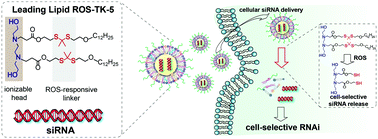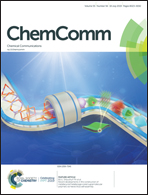Selective RNA interference and gene silencing using reactive oxygen species-responsive lipid nanoparticles†
Abstract
Lipid-complexed small interfering RNA (siRNA) nanoparticles are promising gene regulation materials with excellent genetic, but little cellular, selectivity. Herein, we report a chemical strategy to enhance the gene silencing selectivity of these nanoparticles against cancer cells through the covalent integration of a reactive oxygen species (ROS)-degradable thioketal into the lipid nanoparticles. These lipid nanoparticles can efficiently deliver siRNA into cells, and selectively silence cancer cell gene expression in response to the high levels of intracellular ROS in cancer cells.



 Please wait while we load your content...
Please wait while we load your content...